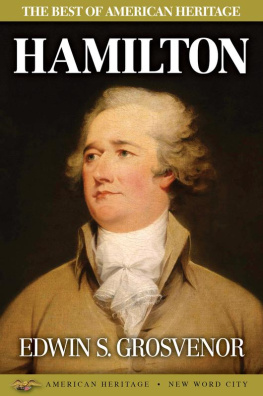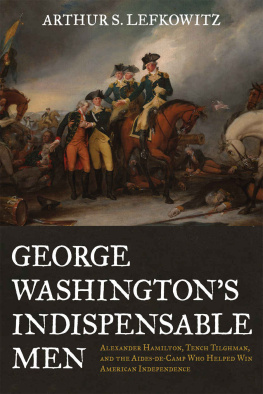The American Generals
John Frost
Contents:
The American Generals
Colonel Aaron Burr
Alexander Hamilton
Alexander Macomb
The American Generals, J. Frost
Jazzybee Verlag Jrgen Beck
86450 Altenmnster, Loschberg 9
Germany
ISBN:9783849614430
www.jazzybee-verlag.de
www.facebook.com/jazzybeeverlag
admin@jazzybee-verlag.de
THE AMERICAN GENERALS
COLONEL AARON BURR
COLONEL AARON BURR, a character fraught with deep and mysterious interest to every American, was born on the 6th of February, 1756, at Newark, New Jersey. His father was President Burr, of Princeton College, and his mother, a daughter of the celebrated Jonathan Edwards, of the same institution. Both his parents dying while he was but an infant, his education devolved upon a private instructor. The mind that was afterwards to be marked by such strange vicissitudes, soon' began to display its daring character; for, when but four years old, Aaron ran away in consequence of some misunderstanding with the teacher, and was not recovered for three or four days.
When six years old, he was placed under the care of his uncle, Timothy Edwards, at Stockbridge, Massachusetts, where he remained until his entrance into college. During this time he made an attempt to escape from his uncle, and embark on a sea voyage; but he was intercepted and brought back to his residence.
In 1769 he entered Princeton College. Here he pursued his studies with such assiduity, that he soon became the first scholar in his class. This however, does not seem to have arisen from a genuine love of knowledge, but from an anxiety not to be thought below his fellows; for after he had obtained pre-eminence, he suddenly sunk into dissipation and indolence, so that his last year at college was as remarkable for his neglect of study, as the former one had been for his application. In the meanwhile, he formed acquaintance with individuals who afterwards became renowned in different departments of intellect among others Matthias Ogden, afterwards a colonel, Samuel Spring, D. D., and William Paterson, subsequently judge in the United States supreme court.
After leaving college, he devoted much of his time to polite literature, and having ample means at his disposal, soon made rapid advances. At this time also, his mind seems to have been impressed with a sense of the importance of religion, and he communicated his feelings to the venerable Dr. Bellamy, of Connecticut. With that eminent divine he remained for two years, reading on the topics of religion, and pursuing his former studies.
Burr left this hospitable mansion for the residence of his brother-in-law, Judge Reeve, at whose house he resided until the battle of Lexington, in April, 1775. He had already formed his opinion of the contest between England and her colonies, and by study had become thoroughly conversant with the theory of tactics. He accordingly wrote to his friend Ogden, to join the army with him, and they set out together immediately after the battle of Bunker Hill. A sight of the army disappointed him. It was without organization or discipline; and distracted by dissolute habits, and constant contentions about rank. Soon after joining, Burr was attacked by a violent fever, but left his couch, to join the expedition of General Arnold against Quebec.
In that disastrous expedition, young Burr encountered his full share of hardship. He was one of a small party that penetrated through the woods separately, and whose sufferings we];e, if possible, even greater than those of the main body. Burr suffered less than his companions from hunger, on account of his abstemious habits. On one occasion, he was very nearly killed by the passage of his boat down a fall twenty feet high.
When the army arrived at the head of the Chaudiere, Burr was sent in the disguise of a priest, with a verbal communication to General Montgomery. On the way, he encountered a variety of danger and adventure, but reached Montgomery and delivered his message with such accuracy and good sense, that the general immediately adopted him as one of his military family. During the siege and assault of Quebec, he won the approbation of all the officers, by his courage and endurance, and received on one occasion the superintendence of a small advance. He was by General Montgomery when he fell, and besides himself, but one of the attendants escaped unhurt. Arnold then assumed the command; but Burr seems to have been unfriendly to him, as he, on one occasion, positively refused to convey a communication from him to the town, on account of its objectionable contents.
EARLY in 1776, the army moved from Montreal, in its homeward march. On the way the difficulties with Arnold increased, until at length Burr, who was now a major, left him abruptly, in company with four men. This was against the express command of Arnold. When the major arrived at Albany, he received an invitation from Washington to join his head-quarters, which he accepted. The connection was not happy it gave rise to prejudices which were never afterwards abandoned. Soon after he became aid to General Putnam, a situation more congenial to his wishes. While here he became acquainted with Miss Moncrieffe, afterwards the notorious Mrs. Coglar, and was no doubt the cause of her subsequent dissolute character.
Major Burr was in the disastrous battle of Long Island, where he displayed his wonted activity and courage. He had previously made a careful reconnoissance of the enemy, and given his opinion to Putnam against a battle. In the subsequent retreat to New York, he behaved so well as to win the entire confidence of General McDougall, who conducted it.
The British soon followed the American army, and Washington found it necessary to abandon all hope of defending the city against an overwhelming force. During the second retreat, Burr performed an action characteristic of his boldness and energy. Either through mistake or mismanagement, one brigade was left in New York, and posted themselves on an eminence called Bunker's Hill, which was in full view of the enemy. Burr was at this time on a scout for fugitives, and on observing the brigade he rode up to it and asked who commanded, and what they did there. General Knox presented himself. The major urged him to retreat immediately, as otherwise his detachment would be cut to pieces. Knox answered that a retreat in the face of the enemy was impossible, announcing his intention of defending the fort. Burr replied that the place was not tenable, that it would be taken at a single discharge, and those of the garrison who escaped being shot would be hung like dogs. He then exhorted the men to follow him, and actually led them to camp in sight of the enemy, with the loss of only about thirty.
DURING the retreat through the Jerseys, and the subsequent active campaign of General Putnam in that quarter, Burr continued to behave so well as to challenge the respect and confidence of men and officers. In June, 1777, he was appointed lieutenant colonel of the regiment of Colonel Malcolm, at that time stationed in New York. Soon after, he received the chief command through the voluntary absence of the colonel. He performed active service in drilling the troops and cutting up the enemy's picket guards, but soon received orders to join the main army, which he did in November.
At the battle of Monmouth, Burr commanded a brigade consisting of his own and another regiment, and was very active in reconnoitering the enemy, and harassing their skirmishers. His own loss was severe, and he had had a horse shot under him. From constant exposure to fatigue and heat for three days, with very little sleep, he contracted a disease, which affected him for some years, yet so great was his endurance that not only did he continue in the performance of every duty, but did not even mention his indisposition to the other officers.







